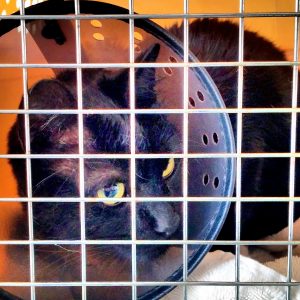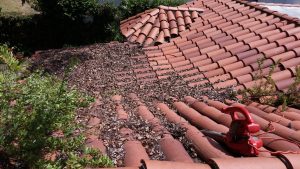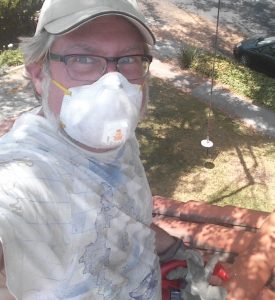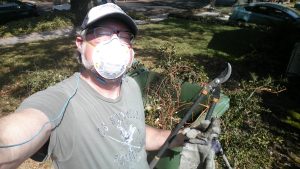The past two weeks wore on me; at times, I felt like I could drown in the pool of stress I had been slowly sweating out of me, a thick quagmire created of my own internal angst that seemed to engulf me from all sides. I’ve drained that pool in the last couple of days after trying a little exercise I like to call Clearing the Roof. Because I realized that stress is a top-down issue, it was going to have to be dealt with right up there, on the roof, where all that clutter and debris had been sitting, decomposing into mucky, thick, unmanageable gunk. Some of it was fresh, identifiable, easily swept away. Some of it had been there for years and was entirely unrecognizable. A whole lot of it, it turned out, was just settled pollution, junk particles that had come to rest because nothing had ever washed them away. It had been a much longer time than I thought since I had done this kind of personal maintenance.
Good thing I had a tall ladder.
But first, some backstory: For years I have talked about the importance of letting go of stress. I have let it eat at me in the past while I absorbed it from other people like an emotional sponge and the effect is that it triggers very strange migraine effects that mess with the speech center in my brain, causes a blind spot that travels across my field of vision and has, on one particular occasion, caused a trans ischemic event that, for those unfamiliar with the term, is kind of like a small stroke during which I lost control of my body, hallucinated that the table full of Happy Hour beer and appetizers was bouncing around, tossing things at me, and then I could not make sentences that anyone (else) could understand for about twenty minutes while my left hand tried repeatedly to climb up my chest.
That event occurred about ten minutes after I turned off my cell phone to relax for the first time in several months while producing a movie and being the go-to guy for every problem, big and small, and everybody was already on their last nerve. I thought I had it all locked down, though. I had stayed cool. I was not letting it get to me, personally, because it was just a job. What I had not realized was that my body did not get the memo I had intellectualized. The minute I let myself relax (not just stumble into a crushing sleep), my physical brain literally short-circuited. Until then, I had no idea that I had an actual migraine condition, because I do not typically have the debilitating pain associated with migraines (I used to, as a teenager, have extremely painful and long-lasting headaches that were precursors to migraines, but they went away and I never looked back). It was not difficult for me to look back over years of experiencing symptoms of migraine with aura, as my condition was defined, and seeing how the unifying trigger was stress. I decided then that I would never let stress affect me like that again, and revamped my approach to dealing with the problems brought to my door.
I was back at work on the movie a few days later and it was eventually completed, the crew intact, everyone ultimately happy and all problems solved. And I committed to never being an emotional sponge again. After all, I did not have to make someone else’s problem my own just to solve it.
I did not, however, have an entire contingency plan for when problems really were my own. For ten or fifteen years, that basic approach I had devised served me quite well. I was able to remain empathetic, solve problems, keep myself mostly stress-free. Now, however, I have a family, a mortgage, and all those things associated with being a parent and homeowner. And while being a creative freelancer is already difficult enough, especially in the summer when work is already thin and bills are higher, I have the extra burden of not being able to work steadily due to my medical process. Having cancer is expensive, and time-consuming, and in general a pretty big hassle. Admittedly, it is still a bit of a shock sometimes when I think of how much the choice to stay alive actually costs, even with particularly good insurance.
A bit over a week ago, bringing this story nearly up to date, I went in for my chemotherapy treatment. It was not a big deal, went smoothly (no difficulty finding a vein, no unexpected issues with the blood work), and seemed to get my week off on “the right foot.” I had planned a few small projects following treatment, but I know that the week is essentially a bust. After all, my body is fatigued and my brain is often plagued by fog or I simply cannot focus for more than a few minutes at a time. So for this week, I try to enjoy the hours I have each morning where mind and body appear to function more or less like normal, then figure I’ll poke around at small tasks or catch up on some television, or nap. Sometimes I surprise myself by getting a project finished, but I do not count on it. Other things I did not count on this particular week were a Notice of Non-Compliance from the Los Angeles Fire Department and catching a cold from my daughter.
But like a little bomb dropped from the heavens, this piece of paper showed up when the effects of the chemo were just settling in a couple of days after my infusion. It seemed innocuous enough, if not particularly clear on what work needed to be done. Then there was the very shady part that stated a relatively hefty fine if the work was not completed — and less than two weeks to get the work done before said fine would be levied.
It took me a day or two before I could even look at the notice and try to make sense of what needed to be addressed, and then it was the weekend and, as luck would have it, we were looking at an extended weekend due to Independence Day. I would not be able to get any information from the City on what was really expected or how to approach completing the work until at least Tuesday, so it had to get filed and set aside. But it made me itch, inside. It kept poking at me, waking me at night, creeping under my skin.
While I was occupying my mind with worst-case scenarios about the fire department’s requirements, the light cold that began as just a drippy nose and impacted sinuses decided to relocate to my lungs and give me a small, but consistent cough. That would not have concerned me too much on its own, but it was exactly two years ago that I developed a cough that would not go away and had me convinced that I had walking pneumonia — a condition I most likely was developing, though it cleared up with antibiotics just about the same time we discovered the tumor in my lung. It was no longer just the Notice of Non-Compliance that was waking me at night. Now I was getting full-blown panic attacks about contracting pneumonia. A compromised immune system is particularly susceptible, after all. I knew it was not going to happen over night, and that the sensible thing was to wait and see; and I knew that the symptoms I had were completely in line with a small, mostly harmless cold. Slowly, like a rising tide, I could feel that pool forming around me, squeezing in with the pressure.
Between the chemo and the cold, I was beyond exhausted. I was only sleeping sporadically and my body was aching badly when I would rise in the morning. It was hard to appreciate that the rest of my usual symptoms following treatment were almost non-existent. I had no issue with digestion, my food never tasted particularly bad, my extremities even retained most of their sensitivity. But, damn, I was sleepy.
To make matters worse, my cat had developed a soft lump under his skin. The lump was noticed on Friday night, seemed larger on Saturday and Sunday; while I was trying to monitor it for another day, Monday morning it was suddenly gone and there was a bloody, bald patch and a hole where the lump had been. I had suspected an abscess and cleaned it as best I could, but that meant for sure that I had to get him into the vet — and one more day before I could really get answers from the city.
The pool water was getting icy and uncomfortable and much, much thicker.
 Watching the weekend fireworks display reminded me about the simple joy of marveling at something bigger. Bigger than me. Bigger than all my troubles. Bigger than my fears. But I still had to deal with the realities of time, money, health and family obligations. Time was definitely pressing me hard by Tuesday morning.
Watching the weekend fireworks display reminded me about the simple joy of marveling at something bigger. Bigger than me. Bigger than all my troubles. Bigger than my fears. But I still had to deal with the realities of time, money, health and family obligations. Time was definitely pressing me hard by Tuesday morning.
The first thing I did was fire off an email to my oncologist, then while my wife went in to work, I dropped my daughter at camp and got on the phone with the vet to see when I could be fit in to the day’s schedule. Within a couple hours, I had a “best be on the safe side” prescription for Levofloxacin, the same antibiotic that cleared my lungs quickly two years prior. This way, whether the shift to my lungs was viral or bacterial, chances were pretty good that I would be ready in time for my next round of chemo (viral infections tend to clear up in about two weeks on their own, a bacterial infection should be gone well within my ten day regimen of pills).
As I popped the first tablet, I remembered the potential side effects of this particularly strong antibiotic. Key among them is a potential tightening of the muscles and ligaments, making it particularly easy to tear, for example, a rotator cuff or a tendon. That translates to limiting exercise and heavy lifting. I realized that if I was going to get the required yard work done on schedule, I had maybe a two day window to complete everything.
Stress and urgency are two completely different sensations.
We create stress for ourselves, from within. We use it to fill up space. The more room stress has to grow, the greater we will cultivate it and use it to fill in the gaps, push out the air, stifle ourselves from the inside. Urgency comes from outside, from things that need to be done, and it comes from the inside from our passions. Urgency urges movement. Stress grasps hold, stagnates, oppresses our rhythms, our thoughts, the very sense of motion.
As such, stress and urgency are in opposition to one another. I thought about this as I contemplated what a terrible procrastinator I tend to be and why I function so well with concrete deadlines and last-minute creative bursts. That urgency, the knowing that the clock is ticking, is worth more than an adrenaline surge; it overpowers the stress by forcing action, and that was it, that was my key. I had two days and no more. When I assessed the work, it was very clear to me what needed to be done and how to do it.
 I had a bit of good fortune in that my vet visit was not egregiously long, and that I had done a very good job of cleaning the open wound on Monday so that it was not infected by the time we got in on Tuesday afternoon. Like me, the cat was now on antibiotics, though he got off with just a shot rather than having to dose up every day. Of course, he still had to wear a cone around his neck, and that kind of sucked for him. Also good fortune, I slept reasonably well Tuesday night because I knew one thing was certain:
I had a bit of good fortune in that my vet visit was not egregiously long, and that I had done a very good job of cleaning the open wound on Monday so that it was not infected by the time we got in on Tuesday afternoon. Like me, the cat was now on antibiotics, though he got off with just a shot rather than having to dose up every day. Of course, he still had to wear a cone around his neck, and that kind of sucked for him. Also good fortune, I slept reasonably well Tuesday night because I knew one thing was certain:
It was time to clear the roof.

 On Wednesday morning, I pulled out the tools. The ladder went up, so I could assess the situation from a proper vantage point. Figured I would hit this with everything I had, hit it hard and get it over with as quickly as possible. It proved to be a huge undertaking, because as we all discover when we begin flensing off the outer layers, it sometimes takes a while to get down to the meat. I had thoroughly underestimated the garbage that had to be cut through, and how long the resulting cleanup was likely to take. But once started, there was nothing to do but commit to completion. I was pleasantly surprised to realize that once I simply decided to finish the task, it was actually quite straight forward and simple.
On Wednesday morning, I pulled out the tools. The ladder went up, so I could assess the situation from a proper vantage point. Figured I would hit this with everything I had, hit it hard and get it over with as quickly as possible. It proved to be a huge undertaking, because as we all discover when we begin flensing off the outer layers, it sometimes takes a while to get down to the meat. I had thoroughly underestimated the garbage that had to be cut through, and how long the resulting cleanup was likely to take. But once started, there was nothing to do but commit to completion. I was pleasantly surprised to realize that once I simply decided to finish the task, it was actually quite straight forward and simple.
Moving through life is not all that hard when you shake things free and commit to your goal, even if you have to remain flexible with how you achieve it.
 Of course, what you may not realize while you are clearing the roof is that all the clutter has to settle somewhere. And when it does, it still needs to be cleaned up. We cannot fully escape all the pollution, all the junk, all the tasks that endlessly seem to get in our way.
Of course, what you may not realize while you are clearing the roof is that all the clutter has to settle somewhere. And when it does, it still needs to be cleaned up. We cannot fully escape all the pollution, all the junk, all the tasks that endlessly seem to get in our way.
But we can methodically deal with all that debris. It just takes a bit of focus and determination.
And some degree of resignation, as well. Because even after the job at hand is finished, as the last bit of dust is blown away or the last remaining handful is gathered and tossed securely into the proper can, there is already more stuff that the world is blowing around, more junk settling right up there, back on your roof.
The lesson here goes beyond raking debris off the top of a house. While it is important to prevent buildup that becomes a fire hazard, it is arguably more important to clear out our psyche with some regularity. And regularity is the key to this process — it is not enough to do it only when you are served official notice. By then, any buildup has most certainly gone on too long, threatening to damage the structure upon which it rests. By clearing more often, of course we benefit from requiring decidedly less effort each time. Better still, we allow ourselves to be free of all the clutter, the unnecessary pressure, the abject pollution that otherwise saps mind and spirit while wearing down the body.
I would like to think I have learned now to keep the maintenance consistent. I will be looking at my roof, keeping my eyes raised and vigilant for any sign that the broom needs to come out.
And here is Derek Zoolander explaining why it is important to wear a mask when you are kicking up copious amounts of debris, dust and dirt:

If this post resonates with you, please consider supporting me on Patreon.




1 thought on “Clearing the Roof”